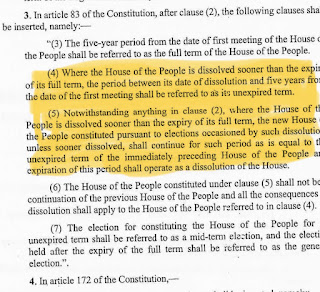Union Cabinet approved the ‘One Nation, One Election’ proposal on December 11, 2024. The proposal aims to conduct simultaneous elections of Lok Sabha and Assemblies, followed by urban body and panchayat polls within 100 days. The proposal is a follow up of the recommendations of the High-Level Committee led by former President Ram Nath Kovind, formed in September 2023. The Committee had submitted the 18,626 pages long report in March 2024.
A statement from the Union government said, “The Union Cabinet has accepted the recommendations by the high-level committee on ‘One Nation, One Election. Cabinet approved the proposal unanimously. In the first phase, Lok Sabha and Assembly elections will be conducted. In the second phase, elections for local bodies, such as Gram Panchayats, Blocks, Zila Panchayats, municipalities, and municipal corporations, will follow. An implementation group will be formed to carry forward the recommendations of the Kovind panel on simultaneous elections. Our government is committed to building a consensus on matters that impact democracy and the nation in the long run."
The Constitution (One Hundred and Twenty-Ninth Amendment) Bill, 2024 dated December 12, 2024 with five clauses has been drafted to undertake significant amendments to the Constitution to facilitate simultaneous elections. The proponents have introduced a concept of “mid term elections”. This implies that if the government falls in the fourth year, the election shall be for the unexpired term-namely one year.
Proposed Article 82A can be invoked only on the date of the first sitting of the Lok Sabha after a general election. This implies that in any case it will have its effect (simultaneously elections) after nine years, i.e. in 2034.
Parliamentarians from among the opposition have asserted that the Bill hits the Basic Structure of the Constitution, adding that proposed Article 83(5) is contrary to Article 83(2). The State Legislative Assembly is not subordinate to Central govt or Parliament. Tenure of State Assembly depending on tenure of Lok Sabha is inconsistent.State has power to legislate under Schedule VII, List II of the Constitution. The autonomy of State assembly can't be taken away. Hits Basic structure of Constitution. According to the Bill, the Election Commission of India can make a recommendation to the President to postpone elections to any state assembly. Any state where the ruling party expects to lose can be postponed.
Amendments proposed
I. Insertion of Article 82A – Simultaneous Elections
Article 82A will be inserted to mandate simultaneous elections to the Lok Sabha and all State Legislative Assemblies. The President, through a public notification issued on the date of the first sitting of the newly elected Lok Sabha, will enforce this Article. The term of all Legislative Assemblies elected after the notification date will end alongside the Lok Sabha’s term.
II. Conduct of Simultaneous Elections
Article 82A(3) empowers the Election Commission to conduct general elections to the Lok Sabha and all State Assemblies simultaneously before the expiry of the Lok Sabha's term. The provisions of Part XV (Elections) of the Constitution will apply, with modifications as specified by the Election Commission.
III. Deferred Elections
Article 82A(5) allows the Election Commission to recommend deferment of Assembly elections if they cannot coincide with Lok Sabha elections. The President may issue an order to conduct such elections at a later date.
IV. Legislative Assembly’s Term
Even if elections are deferred, the Legislative Assembly’s full term will end simultaneously with the Lok Sabha’s term, overriding Article 172.
V. Provisions for Mid-Term Elections- Amendments to Article 83 (Lok Sabha)
Clauses 3 to 7 of the Bill addresses mid-term elections if the Lok Sabha is dissolved early. The new Lok Sabha elected during the mid-term election will serve only the unexpired term of the dissolved Lok Sabha. Similar provisions will apply to State Assemblies, ensuring alignment with Lok Sabha terms during mid-term elections.
The Statement of Objects and Reasons of the Bill claims that the proposal will reduce disruption caused by frequent elections and the imposition of the Model Code of Conduct. It will ensure uninterrupted development programs and it will prevent diversion of human power for prolonged election duties.
Also read: Why Say No to Electoral Bonds, Donor-driven ‘One Nation, One Election’ and One Unique Identifier?


No comments:
Post a Comment